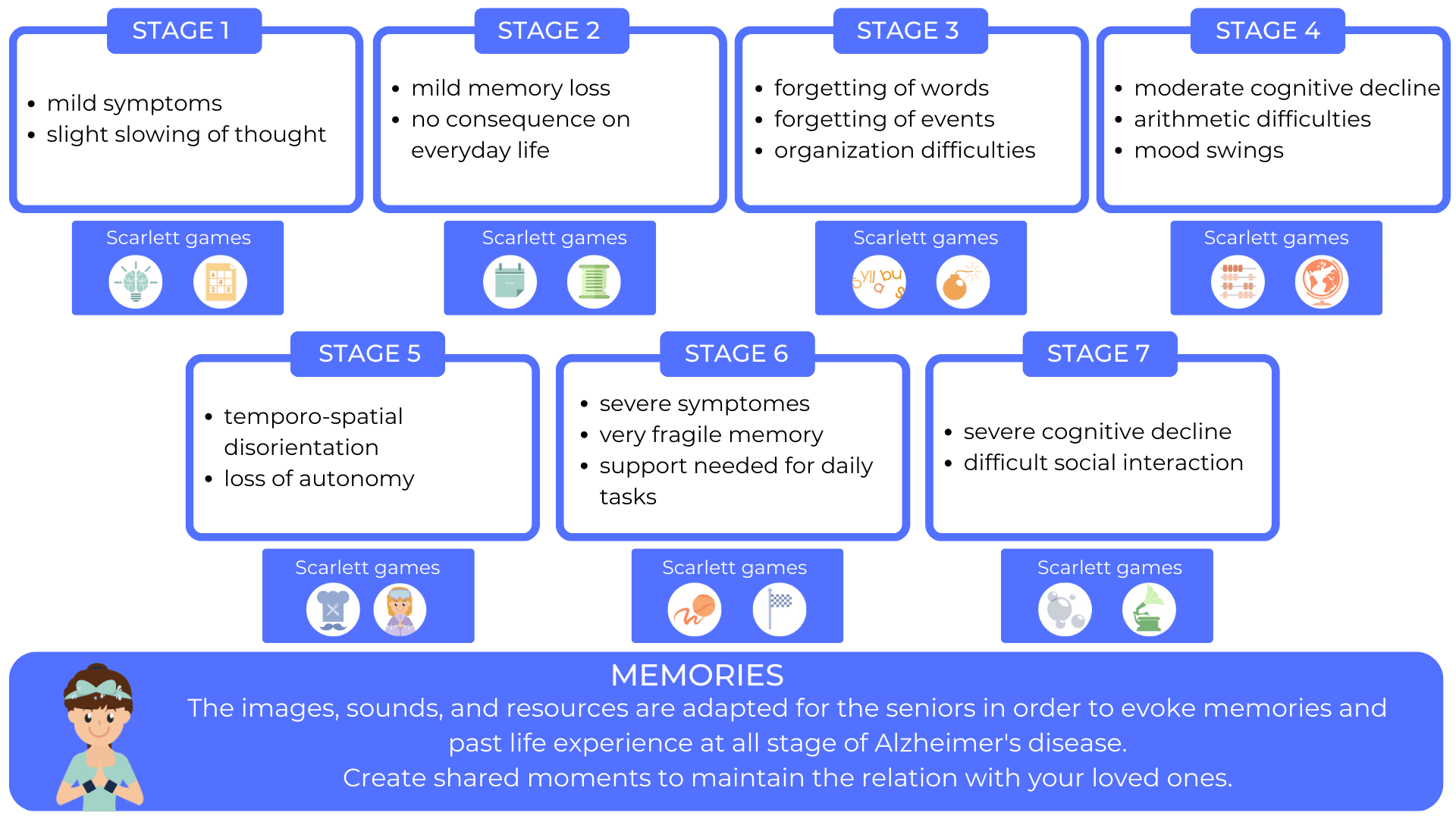Alzheimer’s disease is a difficult reality for many families. In addition to the medical challenges, it is essential to preserve the dignity of our loved ones affected by this devastating disease. In this article, we’ll explore strategies and practical tips for helping your loved one while respecting their dignity.
Dignity: A pillar of self-esteem for seniors
Dignity is intrinsically linked to the self-esteem of the elderly. As seniors age, they can face challenges such as loss of autonomy, healthcare dependency and reduced mobility. Preserving their dignity means recognizing their value as individuals, despite these obstacles.
By ensuring that seniors retain their dignity, we help to boost their self-esteem. This can have a significant impact on their self-confidence and their ability to maintain healthy social relationships.
Dignity: a key factor in mental and emotional health
Dignity plays a crucial role in the mental and emotional health of senior citizens. Respecting their autonomy and personal choices is essential to their psychological well-being. Senior citizens must be treated with respect and consideration, and their individual preferences must be taken into account in all aspects of their lives, including medical decisions, housing and leisure.
When seniors feel respected and worthy, they are more likely to maintain a positive frame of mind, fight depression and build strong social relationships.
Tips for preserving the dignity of an elderly person with Alzheimer’s disease
Alzheimer’s disease can present unique challenges when it comes to preserving the dignity of elderly sufferers. Today, we’ll explore essential tips to help loved ones and caregivers maintain the dignity of these vulnerable people.
-
Provide constant emotional support
One of the most important aspects of preserving the dignity of a person with Alzheimer’s disease is providing constant emotional support. People with this disease can often experience confusion and frustration, which can affect their self-esteem. Taking the time to listen, reassure and support them in their emotions goes a long way towards maintaining their dignity.
Using non-verbal communication, such as eye contact, affectionate gestures and smiles, can help establish an emotional connection and reinforce their sense of dignity. Use clear, gentle and patient communication. Listen actively and be attentive to their emotional needs.
-
Respect individual routines and preferences
To preserve the dignity of a person with Alzheimer’s disease, it’s essential to respect their daily routine and individual preferences as much as possible. This can include activities she enjoys, regular mealtimes and appropriate rest periods. Regular routines can be soothing. Establish a daily routine that promotes stability.
By maintaining a familiar environment and respecting the person’s lifestyle, we enable them to retain a sense of control and dignity in their daily lives.
-
Simplify tasks and activities
Alzheimer’s disease can make daily tasks more difficult for the person concerned. To preserve dignity, it’s important to simplify activities and tasks as much as possible. This can include preparing easy-to-eat meals, organizing activities adapted to her abilities and providing a safe, accessible environment.
When tasks are simplified, people can feel more competent and autonomous, which enhances their dignity.
-
Provide a safe and comfortable environment
Creating a safe, comfortable environment is crucial to preserving the dignity of a person with Alzheimer’s disease.
This may include :
-
- Fall prevention: Make sure the living space is free of obstacles, with non-slip mats and ramps if necessary, to reduce the risk of falling.
- Installing security devices: Install security locks and alarms to prevent the person from leaving the house unattended, while preserving their freedom of movement in certain areas.
- The right layout: Arrange your home so that it feels familiar and comfortable. Use soothing colors, familiar objects and photos to create a reassuring environment.
-
Respect their choices
Respecting the choices of people with Alzheimer’s disease is essential to preserving their dignity. Although his decisions may seem irrational at times, they are always an expression of his autonomy. To do this :
-
- Involve her in decisions: Whenever possible, give her the opportunity to participate in choices concerning her daily life, such as choosing clothes or activities.
- Pay attention to the person’s signals: Learn to recognize the person’s non-verbal signals and preferences. This can help avoid uncomfortable or stressful situations.
-
Patience and flexibility
Caring for someone with Alzheimer’s disease can be demanding, and it’s essential to remain patient and flexible. Here are some tips on how to do this:
- Managing difficult behaviours: Understand that certain behaviours, such as confusion or agitation, are part of the illness. Stay calm and use calming communication techniques to manage these situations.
- Be ready to adapt: A person’s needs may change over time. Be ready to adjust your approach and care to his changing needs.
In conclusion, to preserve the dignity of a person with Alzheimer’s disease, it’s essential to provide a safe, comfortable environment, respect their choices and demonstrate patience and flexibility. This advice will help to improve the quality of life of people with the disease, and maintain their dignity throughout their journey.
Ask your insurance company for help
When you’re the primary caregiver for someone with Alzheimer’s disease, it’s essential to recognize that you need support too. Many insurance companies and organizations offer services specifically designed to help family carers.
Don’t hesitate to contact your insurance company to explore the benefits and assistance programs available. These services may include :
- Training and resources: Many mutual insurance companies offer caregiver-specific training, providing information on Alzheimer’s disease, advice on care management, and resources for caregivers’ mental and emotional well-being.
- In-home support services: Some mutual insurance companies offer programs that provide in-home support, such as help with bathing, meal preparation and assistance with household chores, which can lighten the burden on the caregiver.
- Financial benefits: Some mutual insurance companies offer financial assistance to caregivers, in the form of allowances or subsidies to cover the costs of caring for a person with Alzheimer’s disease.
You can find a low-cost health insurance plan to help you in your role as caregiver, while preserving your own dignity and well-being as a carer.
Asking your mutual insurance company for help is an important step for family carers caring for people with Alzheimer’s disease. These services can provide financial, emotional and practical support, helping to preserve the dignity of both caregiver and patient.
And to continue stimulating an Alzheimer’s patient
SCARLETT, adapted games


Accompanying a loved one with Alzheimer’s disease

Understanding Alzheimer’s Disease: Symptoms and Stages
Alzheimer’s disease is a progressive neurological disorder that affects memory, thinking, and behavior. Understanding its symptoms and stages can help caregivers provide better support and maintain the dignity of those affected. Here’s a breakdown of the key symptoms and stages of Alzheimer’s disease:
- Early Stage: Mild memory loss, difficulty in finding words, and challenges with planning or organizing tasks.
- Middle Stage: Increased memory loss, confusion about time and place, and difficulty recognizing familiar faces.
- Late Stage: Severe memory loss, inability to communicate effectively, and loss of physical abilities, requiring full-time care.
Recognizing these stages can help caregivers tailor their approach, ensuring that the individual’s dignity is respected throughout their journey.
Engaging Activities for Alzheimer’s Patients
Keeping individuals with Alzheimer’s engaged is essential for their mental health and well-being. Here are some suggested activities that can stimulate their cognitive functions while preserving their dignity:
- Memory Games: Simple memory games can be beneficial. Use cards with familiar images or names to evoke memories.
- Art Therapy: Encourage painting or drawing to allow self-expression. This can be a therapeutic outlet for emotions.
- Music Therapy: Playing their favorite songs can evoke positive memories and improve mood. Consider sing-alongs or music sessions.
- Gardening: If possible, involve them in gardening activities. The physical activity and connection with nature can be very soothing.
These activities can help maintain cognitive function and provide a sense of accomplishment, thereby enhancing their dignity.
Communicating Effectively with Alzheimer’s Patients
Effective communication is crucial when interacting with individuals suffering from Alzheimer’s disease. Here are some strategies to enhance communication while respecting their dignity:
- Use Simple Language: Speak clearly and use simple sentences. Avoid complex phrases that may confuse them.
- Be Patient: Allow them time to respond. Patience can help reduce frustration and enhance their confidence in communicating.
- Non-verbal Cues: Pay attention to body language and facial expressions. Non-verbal communication can often convey more than words.
- Stay Calm: Maintain a calm demeanor. A soothing tone can help create a comfortable atmosphere for conversation.
By adopting these communication strategies, caregivers can foster a respectful environment that upholds the dignity of those with Alzheimer’s.
The Role of Nutrition in Alzheimer’s Care
Proper nutrition plays a vital role in the overall health of Alzheimer’s patients. A balanced diet can support brain health and improve quality of life. Here are some nutritional considerations:
- Brain-Healthy Foods: Incorporate foods rich in omega-3 fatty acids, antioxidants, and vitamins. Examples include fish, nuts, berries, and leafy greens.
- Hydration: Ensure adequate fluid intake, as dehydration can worsen cognitive function. Encourage drinking water and other healthy fluids throughout the day.
- Regular Meal Times: Establish a routine for meals to provide structure and comfort. This can help reduce anxiety associated with food choices.
- Limit Processed Foods: Reduce the intake of sugars and processed foods, as they can negatively impact overall health and cognitive function.
By focusing on nutrition, caregivers can enhance the well-being of Alzheimer’s patients while promoting their dignity and health.

